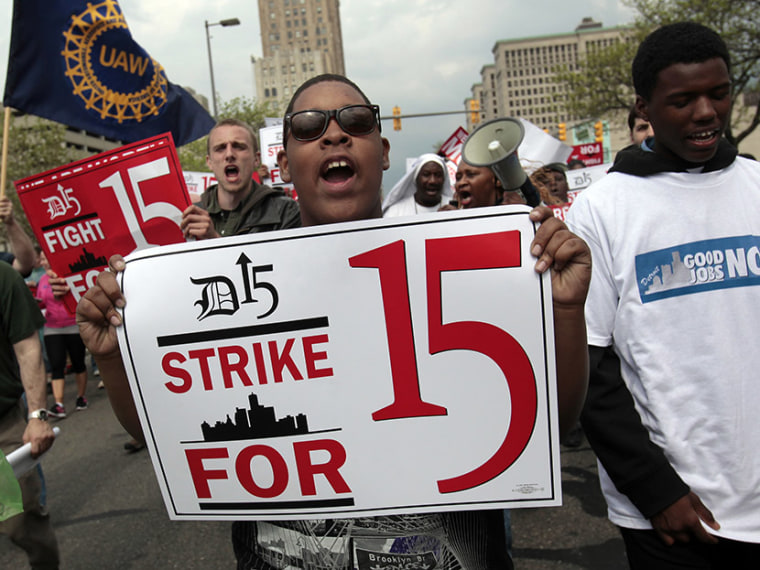Fast food workers in Detroit and Flint, Mich. participated in the week of rolling fast food strikes on Wednesday, the third straight day of labor activism in what now appears to be the largest industrial action in the industry's history. This is Flint's first strike of fast food workers and Detroit's second, following an early May work stoppage in which roughly 400 workers participated.
That strike occurred only a few months after Michigan became a right-to-work state and Republican Governor Rick Snyder decided to appoint an Emergency Manager who would have the power to override Detroit's elected government. Now, the city's prospects look even darker; the unavoidable context of this second strike is Detroit Emergency Manager Kevyn Orr's recent decision to have the city enter bankruptcy.
Rev. Charles Williams II, president of the National Action Network's Michigan chapter, said that raising wages in the fast food industry was key to revitalizing the cash-strapped city.
"The problem that Detroit has is not the problem of a deficit and debt," he said. "The problem is we need reinvestment, we need jobs." If decent jobs return to the city, he argued, then so will a decent tax base.
Currently, more than twice as many Detroit residents work for fast food restaurants than for the auto industry, according to the National Employment Law Project. The average hourly wage in the fast food industry is as low as $9.00 per hour, compared to the $20.67 per hour average found in automobile manufacturing. As good jobs have fled the city, so has its population, which has tumbled from roughly one million people to only a little more than 700,000 in the past twenty years.
Claudette Wilson is one of those left behind. She's currently an undergrad at the Art Institute of Michigan, but to make ends meet she works two part-time jobs, one at Burger King and the other at Jep's Pizza.
"I had been working at Burger King on and off for three years," she told msnbc. "A lot of times we've been understaffed, so I had to do multiple positions, long shifts, for the same amount of money." She makes $7.40 per hour at Burger King, and says she was not paid for overtime.
"At forty weeks in a year, that's supposed to be $15,000, right? Is that a lot of money to you?" she said. "That's if you get forty hours a week. Now a lot of people don't get forty hours." That meager pay inspired her to join the fast food workers' movement shortly before its first Detroit strike in May.
While raising wages for people like Wilson might help create more tax revenue for Detroit, it won't be enough to pull it out of its projected $18 billion debt hole.
"It would generate some millions of dollars, perhaps, but that wouldn't be nearly what's needed," said Michigan State University economist Eric Scorsone. Instead, state-funded pensions are expected to take a massive cut during the city's bankruptcy.
Wally Turbeville, a senior fellow with the progressive think tank Demos, said that looming pension cut and other recent deficit-trimming measures in Detroit were "part of the same fabric" as wage suppression in the fast food industry.
"It serves the interests of the folks who are in charge in the Michigan State House, and it also serves the interests of corporate profits," he said. "Getting rid of the unions at all levels is something that has a benefit" to corporations and their political allies.
Rev. Williams said the fast food workers he had encountered also view Emergency Management, bankruptcy, and low private-sector wages as part of the same battle.
"They feel like this is also a stand against the system that is basically disenfranchising their vote and taking away their voice in Detroit," he said.
